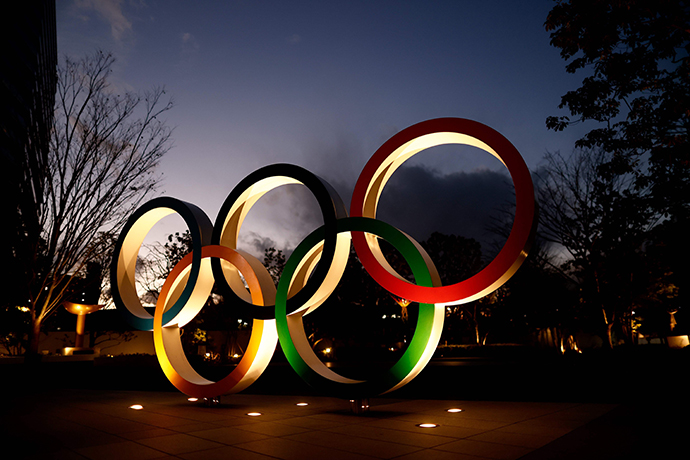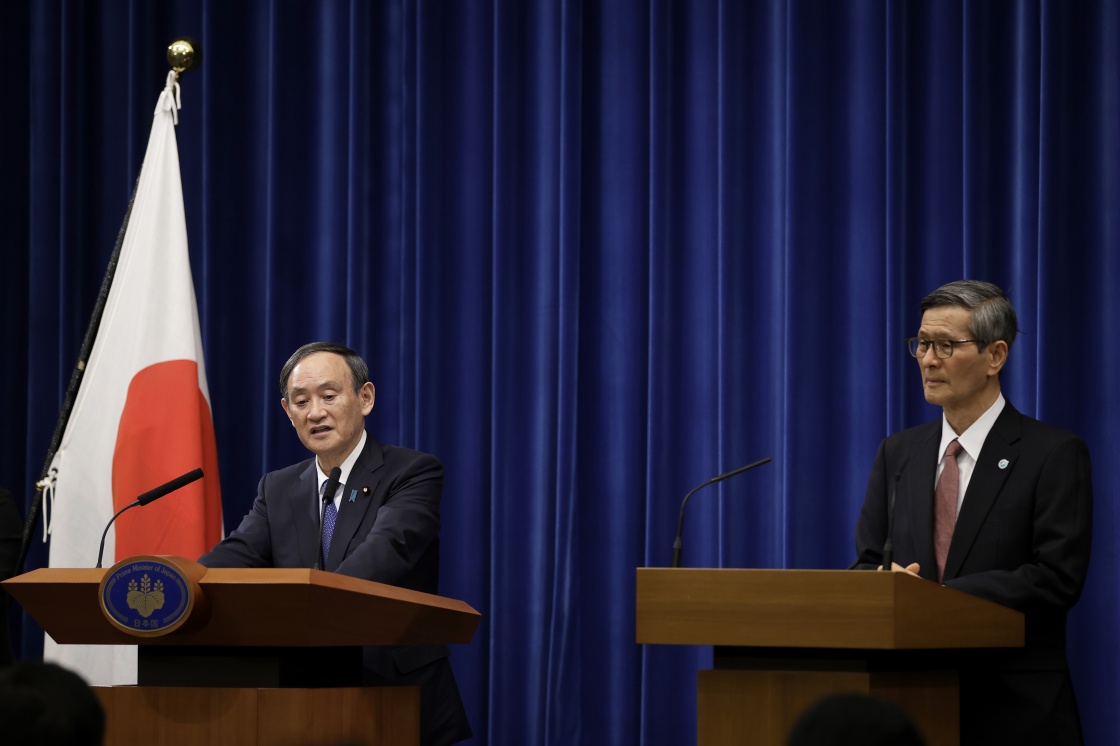Is the prospect of Tokyo Olympic Games hanging again? Huge investment and economic pressure have made Japan hope for vaccines.

On January 8, 2021, Tokyo, Japan, looking forward to the 2020 Tokyo Olympic Games, the Olympic rings around the Tokyo Olympic Stadium were eye-catching. People’s visual map
Last March, when the Tokyo Olympic Games was officially postponed for one year, the world sports world was shocked by it. Now nearly one year has passed, but the prospect of the postponed Olympic Games is still in the air.
On January 8, dick pound, a member of the International Olympic Committee, said in an interview that he was not sure whether the Tokyo Olympic Games could be held as scheduled this summer, which once again triggered discussions.
Against the background of the COVID-19 epidemic surging overseas, the Japanese people’s attitude towards the Olympic Games has indeed fallen into pessimism again, and the epidemic storm that is difficult to calm in Europe and America has cast a shadow over the prospect of this world sports event.
However, considering the huge cost that has been invested and the vaccination plan that has been introduced, there is still a "retreat" that has been postponed compared with last year. Now Japan, which is pushed to the edge of the cliff, is bound to not give up any hope.
The Olympics are cancelled? Public opinion changes with the development of the epidemic.
As a member of the International Olympic Committee, dick pound "sang down" the prospect of the Tokyo Olympic Games long before the postponement of the Olympic Games last year. In February last year, he said that "if the Japanese epidemic situation is not optimistic in two to three months, the Olympic Games will be cancelled instead of postponed or changed", which immediately became a hot spot in sports.
Then in late March, the Tokyo Olympic Games was postponed for one year. Although it was not cancelled directly as Pound said, it was enough to shake the world sports.
After that, whether the Tokyo Olympic Games can be held as scheduled has been a hot topic for discussion.
From the announcement of the postponement to now, there have been many public opinion surveys on the prospect of hosting the Olympic Games in Japan. An obvious rule is that whether the Japanese people are optimistic about the prospect of the Olympic Games is directly linked to the epidemic control situation in Japan at that time.
When the postponement of the Olympic Games was just announced in March last year, there were only a few hundred or dozens of new cases of COVID-19 in a single day. At that time, opinion polls showed that 79% of the respondents supported holding the Olympic Games in July 2021.
However, in July last year, there were more than 1,000 new cases in Japan. At that time, a poll conducted by Kyodo News showed that only 24% of the respondents hoped to hold the Olympic Games in 2021, and the proportion of those who hoped to postpone it to 2022 increased to 36%, while the proportion who hoped to cancel it reached 34%.
Then in October 2020, the epidemic in Japan eased. The poll conducted by Asahi Shimbun also shows that people are optimistic about the Olympic Games. 41% of the respondents think that the Olympic Games can be held as scheduled in 2021, 26% think that the Olympic Games may be postponed again, and only 28% think that the Olympic Games will be cancelled.
Recently, the epidemic situation in Japan has surged again, and the number of new cases in a single day has reached record highs, which has exceeded 7,000, and people’s attitude towards the Olympic Games has also declined again.
In a poll conducted by NHK in mid-December last year, only 27% of the respondents thought that the Olympic Games should be held as scheduled, 32% thought that the Olympic Games should be cancelled, and 31% thought that the Olympic Games should be postponed again.

On January 7th, Japanese Prime Minister Suga Yoshihide (left) attended a press conference in Tokyo, and the Japanese government once again declared a state of emergency in some areas. Xinhua news agency
As Japanese Prime Minister Suga Yoshihide announced that the metropolitan area was in a state of emergency again on January 8th, pessimism about the Olympic Games was still rising. According to a Japanese online survey, 88.8% of the respondents think that the Tokyo Olympic Games will be cancelled, while only 4.5% think that the Olympic Games can be held as scheduled, and 6.1% think that the Olympic Games will be postponed again.
Huge costs have been invested, waiting for the vaccine to "save lives"
It has to be admitted that according to the current surge of the epidemic overseas, it will be impossible to host the Olympic Games if the epidemic in Japan and many countries in Europe and America cannot be effectively controlled.
On January 7, the Tokyo Metropolitan Government announced that due to the increasingly serious epidemic situation, the Olympic torch tour activities in various cities and districts in Tokyo will also be temporarily suspended.
But Tokyo, which has already suffered an Olympic postponement, has no way out.
As early as last May, IOC President Bach publicly revealed that the IOC had no plans to postpone the Tokyo Olympic Games again. If the 2021 Tokyo Olympic Games still cannot be held, then there is only one option to be completely cancelled.
Once the tournament is cancelled, it means that all the huge costs invested by Japan will go to Shui Piao, which is naturally an unacceptable result for Japan.

On January 8, at Shinagawa Station in Tokyo, Japan, people wore masks to travel. Xinhua news agency
According to the data released by the Organizing Committee of the Tokyo Olympic Games on December 23rd last year, the budget of the Tokyo Olympic Games reached 1.35 trillion yen (about 84.1 billion yuan) before the decision to postpone. After the decision to postpone, the budget of the event increased by 294 billion yen (about 18.3 billion yuan), and the budget increased by 21.8%. In the increased budget, the cost for responding to the COVID-19 epidemic reached 96 billion yen.
In these huge budgets, a considerable part has been put into use. Once the Olympic Games are finally cancelled, Japan will almost "get nothing", which is undoubtedly a disaster in economy.
In order to avoid such an outcome, Japan is bound to use all means to ensure that the Tokyo Olympic Games can be held. Under pressure, Yasuhiro Yamashita, president of the Japanese Olympic Committee, also began to let go in an interview on January 4. "Tokyo can’t host an Olympic Games like London and Rio, and the form of the Olympic Games will change. There may be no audience, and there may be no interaction between athletes and the public."
This is a big concession compared with the statement made by Mori Yoshiro, chairman of the Tokyo Olympic Organizing Committee, in July last year that the Olympic Games will not be held empty.
However, the most effective way to fundamentally guarantee the safety of the Tokyo Olympic Games is vaccine, which has become the "life-saving straw" for the current Tokyo Olympic Games.
According to NHK TV in Japan, the Japanese Ministry of Health, Labor and Welfare has issued instructions to vaccinate medical practitioners with COVID-19 vaccine in late February 2021, to vaccinate the elderly in late March and to vaccinate others after April. Japan’s Ministry of Health, Labor and Welfare has reached relevant agreements with three pharmaceutical companies in Europe and America to purchase a total of 290 million doses of COVID-19 vaccine. If each person is injected with two doses as required, the vaccine purchased by Japan will be enough for 145 million people to be vaccinated.
However, it is still unknown whether this plan can be completed on time and in quantity. In addition, it is also unknown whether European and American countries can control the epidemic and whether athletes from many overseas countries can ensure healthy participation. Even if the Tokyo Olympic Games can finally be held, it may be a "incomplete" Olympic Games.